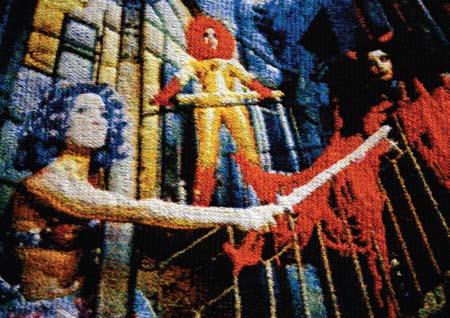
Artists Criticize Apexart for Delaying Palestinian Art Exhibition

**Postponed Palestinian Identity Exhibition Highlights Censorship in the Arts**
An art exhibition centered on Palestinian identity and cultural heritage, originally scheduled to open on January 17 at Apexart, a nonprofit arts organization in New York, has now been indefinitely postponed. The decision to delay the show, titled *On my Fingertips*, has ignited debates on censorship, bias in Western art institutions, and the challenges faced by artists addressing politically sensitive topics.
### The Vision Behind *On my Fingertips*
Curated by Noel Maghathe, the exhibition was one of five selected proposals from Apexart’s October 2023 open call for group exhibits, evaluated by over 600 jurors. The show was designed to explore Palestinian storytelling traditions and folklore, illustrating how these traditions remain integral, dynamic aspects of the identities of Palestinian artists. The planned exhibition included works by artists Leila Awadallah, Yasmine Omari, and Kiki Salem, encompassing a range of mediums such as video, installation, performance, and tactile art.
The proposal positioned Palestinian cultural heritage as a living phenomenon—not simply as relics of the past—while tackling themes of land, memory, and identity. This approach resonated deeply with the show’s collaborators, many of whom have personal connections to the region’s ongoing struggles.
### The Dispute Over the Brochure Text
The controversy centered around the text submitted for the exhibition’s brochure in December 2023, written by Maghathe. The text explicitly referred to Israel’s attacks on Gaza as a genocide, informed by concurrent statements from human rights organizations such as Amnesty International and Human Rights Watch. It contextualized the destruction of history and heritage as a backdrop to the folklore depicted in the artworks.
Maghathe argued, “We cannot discuss the folklore of our heritage without acknowledging the ongoing erasure of our cultural history, land, and people.” The text also mourned the destruction of cultural sites and the loss of over 45,000 Palestinian lives following escalating attacks in Gaza that began in October 2023.
However, Apexart’s Executive Director Steven Rand flagged these descriptions as overly political and beyond the scope of the approved proposal. He asked Maghathe to revise terms like “genocide” to neutral alternatives such as “ongoing military action in Gaza.” Furthermore, Rand requested the text be “reworked to include both sides of the argument,” citing that such politically charged language deviated from the proposal and conflicted with Apexart’s identity as an educational organization.
Maghathe and the artists stood firm in their position, asserting that the acknowledgment of political and humanitarian realities was inherent to their work and central to the exhibition itself. The inclusion of these elements aimed to portray the intrinsic ties between Palestinian cultural preservation and the larger socio-political context.
### The Outcome: Postponement
When Maghathe and the artists requested a direct conversation with Rand to discuss the proposed text, Apexart unilaterally announced the indefinite postponement of the exhibition, citing their inability to accommodate schedule changes until at least 2026. Rand defended the decision, stating, “This is not a situation of censorship but rather of maintaining our integrity. Exhibitions must align with the scope of their original proposals.”
For Maghathe, the decision underscored broader patterns of censorship faced by Palestinians in art and media. “This postponement is directly connected to the ongoing suppression of Palestinians speaking candidly about our lived truths and experiences. To imply that this [text] is merely a personal political opinion diminishes the facts that have shaped our history and cultural identity,” Maghathe told *Hyperallergic*.
### Art and Politics: A Fraught Intersection
The incident reflects broader tensions in the art world, where creative expressions often intersect with globally contentious issues. Yasmine Omari, who was slated to exhibit installations exploring her personal return to Palestine, highlighted the inherent challenges of being a Palestinian artist. “For us, as Palestinians, our very existence is seen as political by Western audiences, whether we intend it that way or not,” she explained.
This is not the first time Palestinian artists have faced hurdles in Western art institutions. Many argue that the marginalization of their narratives, often labeled as “too political,” reflects a bias that aims to sanitize or silence these perspectives under the guise of neutrality. Moreover, this hesitation often ignores the lived reality that, for many marginalized communities, cultural heritage cannot be divorced from its geopolitical context.
### A Broader Conversation about Censorship and Representation
The postponement of *On my Fingertips* raises important questions about the boundaries of creative freedom and who has the right to dictate how art addresses sensitive topics. While institutions like Apexart aim to remain neutral educational platforms, critics argue that this neutrality frequently translates to silencing historically underrepresented voices.
“We’re being asked to disconnect part of ourselves—to edit away the pain, loss, and political realities that drive our work and identity,” said Omari in response to the requested